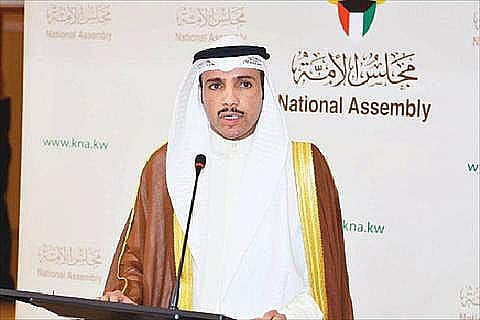Kuwait Speaker leaves door open for all options on GCC pact
GCC Chief says security agreement in line with Kuwaiti constitution and laws

Manama: Kuwait’s parliament Speaker Marzouq Al Ganem has avoided supporting or opposing the Gulf Cooperation Council (GCC) security agreement, leaving the door open for its endorsement or rejection by the lawmakers.
The MPs have been bitterly divided over the merit of the Gulf security pact that has already been ratified by other countries in the GCC, an umbrella for Bahrain, Kuwait, Oman, Qatar, Saudi Arabia and the UAE.
Those who support it say that it helps reinforce relations and security between the member states as it faces a wide array of challenges.
Opponents in Kuwait claim that its articles clash with the constitution and should therefore be rejected.
“I reiterate what I had said earlier: We cannot accept anything that clashes with the constitution or with the political tenets in Kuwait, be it an agreement or a draft law,” Al Ganem said on Sunday. “The constitution is a red line and cannot be subject to political manoeuvring or mileage,” he told the media.
However, the Speaker insisted that Kuwait could not distance itself from its fellow GCC member countries.
“This is a sensitive issue because it includes our Gulf brothers who opened their doors for us. Even if we have remarks or observations, they must be pout forward without any sense of haughtiness,” he said.
One lawmaker last week said that Kuwaitis could not endorse an agreement with states that do not believe in the significance of a constitution.
“It seems that most lawmakers do not wish to rush into endorsing the pact until all the constitutional, legal and political views and opinions are cautiously studied,” Al Ghanem said, quoted by local reports.
“I have already tasked a commission of constitutional experts with drafting a memorandum on the security pact and it will be handed out to all members of the parliament. I do not think that a decision on the pact will be made during this legislative term and I do not think that it will be approved in its current form.
We do need to discern between those who are genuinely keen on new benefits for the people and on public freedoms and those who are using the issue of the pact to gain mileage. There are various views in Kuwait and they must be respected. We do not wish to embarrass the others by delaying our ratification of the agreement, but our constitution is a red line and we cannot accept any pact that clashes with it,” he said.
On Saturday, GCC Secretary General Abdul Latif bin Rashid Al Zayani said the GCC Supreme Council “has tackled Kuwait’s reservation regarding some terms of the GCC Security Pact to bring them in harmony with the Kuwaiti laws and legislations.”
Al Zayani told Kuwait News Agency (Kuna) that the treaty would “contribute to coordination among the GCC police and security agencies and bolster joint security effort” among the member countries.
Joint GCC action is governed by strategies and accords “that regulate the work, and help in realising the anticipated economic, security and defence integration of the member states,” he said.
Al Zayani said that the GCC was important for the regional stability, particularly in the current surrounding disturbances, and stressed “the sagacious policy it adopts” towards dramatic events.
GCC states’ external policies are based on non-intervention in the others’ domestic affairs, renunciation of violence, settlement of disputes through peaceful means and in accordance with international laws, and ensuring the region is free of weapons of mass destruction.
Sign up for the Daily Briefing
Get the latest news and updates straight to your inbox



